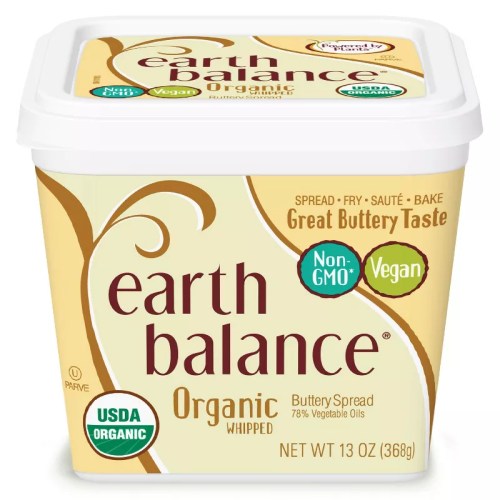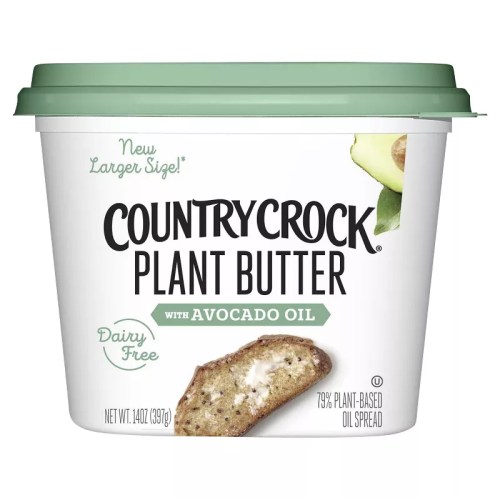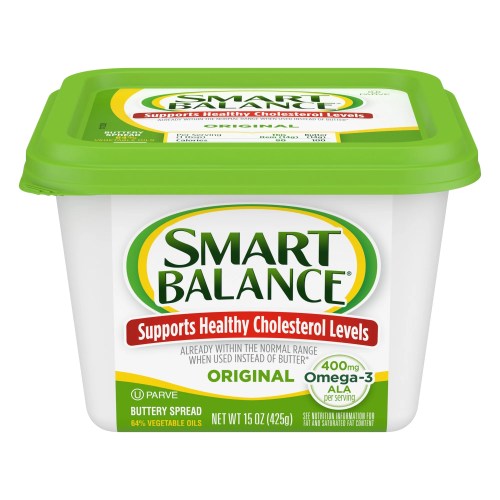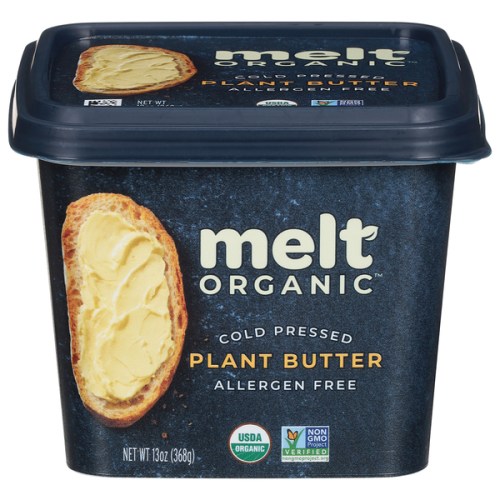From wellandgood.com
The vegan butter market is slaying. No really—so many of the available options taste just like the real thing, making them delicious choices for both dairy-free and dairy-loving folks. In fact, I personally invest in vegan butter and I’m not even dairy-free.
These butter alternatives not only skirt some of the dietary concerns of regular butter, but they can be used in pretty much the very same ways. “My favourite ways to use vegan butter are in baking—think cookies, banana bread, or brownies—where the flavour and texture really matter,” says Sapna Peruvemba, MS, RDN, registered dietitian and founder of Health by Sapna. “I also love it melted over pancakes or spread onto my breads like butter naan, garlic bread, and roti.”
Here’s why vegan butter might be a “better” (and equally delicious) choice compared to the real stuff, plus six of the best brands to reach for on your next grocery run.
Why skip regular butter if you’re not dairy-free?
When it comes to the concerning nutrients found in real butter, saturated fat, dietary cholesterol, and sodium typically top the list. Good news: Vegan butters actually tend to be lower in saturated fat than dairy butter. Though a controversial nutrient in terms of its impact on heart disease, some evidence has shown saturated fat to increase overall risk through elevating blood cholesterol levels.
Therefore, the healthcare community still generally recommends limiting consumption. “In fact, the 2020–2025 U.S. Dietary Guidelines for Americans recommend limiting saturated fat to less than 10 percent of total daily calories,” explains Peruvemba. “On a 2,000-calorie diet, that’s fewer than 200 calories—or roughly less than 22 grams of saturated fat per day, which equates to around three tablespoons of butter if no other sources of saturated fat are consumed.”
Replacing saturated fat with unsaturated fats—like monounsaturated and polyunsaturated fats—can help to lower cholesterol levels and inflammation throughout the body, encouraging better heart health. These types of fats are regularly found in plant-based sources—what vegan butter is made from. “Many vegan butters are made with oils like canola, soybean, olive, and sunflower oils, which are good sources of unsaturated fats,” Peruvemba adds. “However, some are made primarily with coconut oil or palm oil, which are still high in saturated fat so it’s important to check the ingredient list if you're looking for a vegan butter for regular use.” Where vegan butter is a clear step ahead of the regular stuff is its lack of dietary cholesterol. “Vegan butters are made from plant-based sources, so they have no cholesterol, which can increase the risk of heart-related issues,” shares Rhyan Geiger, RDN, registered dietitian and founder of the Phoenix Vegan Dietitian. Similar to saturated fat, there is some conflicting evidence around dietary cholesterol and heart disease risk, but there are also counter studies showing its correlation to increased cardiovascular disease risk, warranting caution around its consumption. While there’s no official maximum intake recommendation for this nutrient, the Dietary Guidelines suggest keeping consumption “as low as possible,” and vegan butter can help you accomplish this goal.
The 6 best vegan butters
Serving Size: 1 tablespoon
Calories: 80 calories
Saturated Fat: 4.5 grams
Total Unsaturated Fat: 4.5 grams
Dietary Cholesterol: 0 milligrams
Sodium: 70 milligrams
Price: $6.99
“While slightly harder to find, Miyoko's vegan oat milk butter has a delicious taste,” says Geiger. And I can absolutely attest to this, as it’s my butter of choice and has been for years. With its smooth, creamy, perfectly salty, and slightly tangy (thanks to the cultured oat milk it’s made with) taste you’d never know it wasn’t the real thing. It’s also organic and made with recognizable ingredients, like turmeric for its butter-yellow color. “This butter has more saturated fat than other plant-based butters, making it more similar to dairy butter in saturated fat content,” Geiger adds. This makes it a great option for baking projects.
Pros:
- Incredible taste
- Lowest sodium content of this round-up
- Organic
Cons:
- Harder to find in some grocery stores (typically sold at some retailers, like Whole Foods)
Serving Size: 1 tablespoon
Calories: 100 calories
Saturated Fat: 3 grams
Total Unsaturated Fat: 7 grams
Dietary Cholesterol: 0 milligrams
Sodium: 105 milligrams
Price: $3.99
“Made with a blend of canola, soybean, flaxseed, and olive oils, Earth Balance provides a good mix of monounsaturated and polyunsaturated fats,” says Peruvemba. “Flaxseed oil is one of the best plant sources of omega-3 fatty acids, a type of polyunsaturated fat important for heart and brain health.”
And this brand has been around for quite a while as far as vegan butters go. “Earth Balance is a classic vegan butter, the Buttery Spread is one of my favourites,” Geiger adds. “It’s made with heart-healthy plant-based oils, has less saturated fat than dairy butter, and has no cholesterol.” Plus, you’ll be sure to find this at most major grocery store chains nationwide. “It’s widely available and affordable, which makes it easy to use regularly for cooking and baking,” Peruvemba agrees.
Pros:
- Widely available
- Excellent, butter-like taste
- Features flax for a healthy dose of omega-3 fatty acids and unsaturated fats
Cons:
- Higher sodium content than regular butter
Serving Size: 1 tablespoon
Calories: 100 calories
Saturated Fat: 5 grams
Total Unsaturated Fat: 5.5 grams
Dietary Cholesterol: 0 milligrams
Sodium: 110 milligrams
Price: $5.99
Country Crock is a brand many of us grew up with…and they’ve been innovating in the plant-based butter space ever since. While they have lots of dairy-free options to choose from, their olive oil-infused plant butter is not to be missed out on. “The olive oil version is my favourite because of its rich, creamy taste and olive oil is rich in heart-healthy monounsaturated fats,” says Peruvemba.
Though this option does have some palm products in it, increasing the saturated fat content, it still measures in at less than regular butter. “It’s also readily available in most grocery stores,” Peruvemba adds.
Pros:
- Excellent taste, ideal for both savoury and sweet culinary pursuits
- Rich in unsaturated fats
- Widely available
Cons:
- Pricier option
Serving Size: 1 tablespoon
Calories: 80 calories
Saturated Fat: 2.5 grams
Total Unsaturated Fat: 6.5 grams
Dietary Cholesterol: 0 milligrams
Sodium: 90 milligrams
Price: $3.99
“Smart Balance Original is made with plant-based oils and has 400 mg of plant-based omega-3s like alpha-linolenic acid (ALA),” Geiger offers. “It has no cholesterol, low sodium, and only 2.5 grams of saturated fat.” This omega-3 content bodes well for inflammation reduction body-wide. Smart Balance, too, has been on the market for a long time, building a strong customer base—largely due to this impressive nutrition. This also means that it’s widely available across the country.
Pros:
- Very low in saturated fat compared to other vegan butters
- Lower in calories and sodium
- Very affordable
Cons:
- Less butter-like flavour compared to other brands
Serving Size: 1 tablespoon
Calories: 80 calories
Saturated Fat: 3.5 grams
Total Unsaturated Fat: 5.5 grams
Dietary Cholesterol: 0 milligrams
Sodium: 80 mg
Price: $6.99
As a newer kid on the block, Melt is making a name for itself with the yummy buttery flavour and impressive nutrition of its plant-based spread. “It’s made with a blend of organic canola, sunflower, and flaxseed oils, which are high in polyunsaturated fats, plus a small amount of coconut and sustainably sourced palm fruit oil,” explains Peruvemba. “Plus, all oils are expeller-pressed, meaning they are mechanically extracted without chemical solvents, preserving more nutrients and flavour.” However, this brand is not (yet) as accessible as others on this list. “Melt is a bit more expensive and harder to find compared to Earth Balance or Country Crock,” Peruvemba adds.
Pros:
- Organic
- Made with a variety of oil sources for rich, butter-like flavour
- Cold pressed for minimal processing and maximum taste
Cons:
- Probably the hardest to find on this list
Serving Size: 1 tablespoon
Calories: 100 calories
Saturated Fat: 6 grams
Total Unsaturated Fat: 5 grams
Dietary Cholesterol: 0 milligrams
Sodium: 85 milligrams
Price: $4.99
Violife is a leader in the dairy-free product movement, offering a variety of cheese, creamer, and dip alternatives. So, it’s no surprise that they also produce top-notch plant-based butter. “Violife includes coconut oil (higher in saturated fat) along with canola and sunflower oils to add some polyunsaturated fats,” says Peruvemba. “Because of the higher saturated fat content and price, I tend to save this one for baking special treats like cookies or pastries rather than using it daily for cooking or spreading.”
This tasty option is usually my runner-up purchase when Miyoko’s isn’t in stock at my local grocer.
Pros:
- Luxurious, rich flavour
- Moderate sodium content, comparatively
- Available in many large-chain grocery stores
Cons:
- Higher saturated fat content






No comments:
Post a Comment